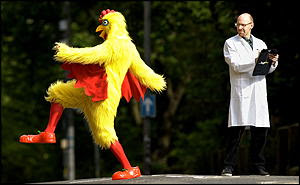An academic at Edinburgh University is studying jokes in an attempt to find out how they work.Dr Graeme Ritchie said he was not investigating whether jokes were funny, but the ways in which people
communicate through humour.
communicate through humour.
He said he would "dismantle" jokes and rephrase them to discover their linguistic features.
Commenting on his project, Dr Ritchie said that despite centuries of philosophical discussion, there was "no full and complete theory of humour".
Dr Ritchie, who is based in the university's Institute for Communicating and Collaborative Systems, said he would be concentrating on jokes that were small enough to be described easily and are self-contained.
He will draw upon material from joke books, the internet and academic books.
Dr Ritchie said the research would help to improve general understanding of the way people communicate with each other.
"Humour is complex, but largely unexplained behaviour," he said.
Little data
"It has great importance in culture and society, but we do not know why it should have developed.
"The explanation is not obvious, as it might be in the case of a key human drive, like the need to feed."
He added that the key lay in the study of linguistics.
Dr Ritchie said: "Modern linguistics builds upon centuries of detailed descriptive work, but humour research has very little analysed data on which to base theories.
Precise accounts
"To make progress, research into humour has to take a similar step to linguistics, and we need to produce precise and detailed scientific accounts.
"The outcome of this research will be the creation of a theoretical framework, that is, a set of basic linguistic ideas and methods suitable for spelling out the mechanisms that underlie jokes."
Dr Ritchie is supported by a fellowship from the Leverhulme Trust.
Commenting on his project, Dr Ritchie said that despite centuries of philosophical discussion, there was "no full and complete theory of humour".
Humour is complex, but largely unexplained behaviour
|
Dr Graeme Ritchie
|
He will draw upon material from joke books, the internet and academic books.
Dr Ritchie said the research would help to improve general understanding of the way people communicate with each other.
"Humour is complex, but largely unexplained behaviour," he said.
Little data
"It has great importance in culture and society, but we do not know why it should have developed.
"The explanation is not obvious, as it might be in the case of a key human drive, like the need to feed."
He added that the key lay in the study of linguistics.
Dr Ritchie said: "Modern linguistics builds upon centuries of detailed descriptive work, but humour research has very little analysed data on which to base theories.
Precise accounts
"To make progress, research into humour has to take a similar step to linguistics, and we need to produce precise and detailed scientific accounts.
"The outcome of this research will be the creation of a theoretical framework, that is, a set of basic linguistic ideas and methods suitable for spelling out the mechanisms that underlie jokes."
Dr Ritchie is supported by a fellowship from the Leverhulme Trust.


No comments:
Post a Comment